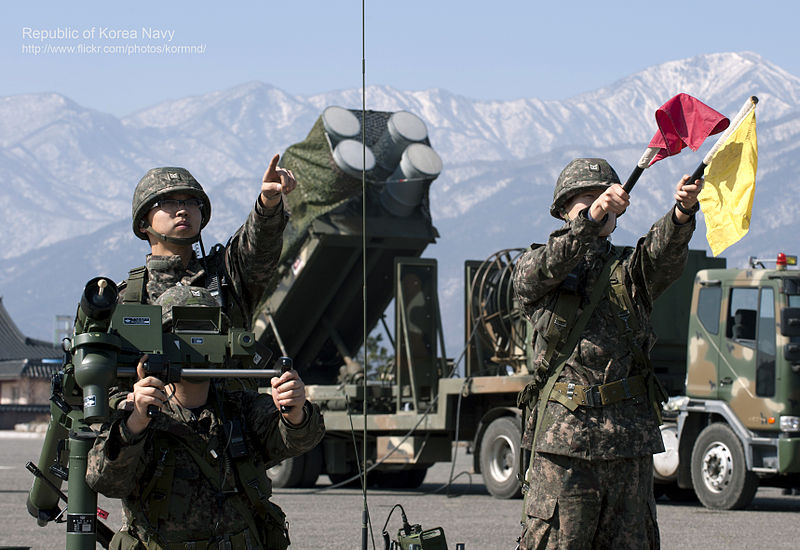South Korea conducted a successful test of its anti-ballistic missile system this week, according to media reports. This marks the latest effort by Seoul to boost its defenses and counter North Korea.
Media reports said Tuesday that South Korea tested its L-SAM interceptor system, successfully destroying a target for the first time in a test, citing military and government sources. The test also included a version of the L-SAM designed to shoot down an aircraft. According to South Korea’s Agency for Defense Development, the L-SAM is a “cutting-edge indigenous weapon system” under development to counter missiles and other aerial threats.
The missile system was successfully tested for the first time in flight back in February. The system was also made to be part of a “layered defense network” that also includes the US-made Patriot Advanced Capability-3 missiles and locally-made Cheongung II KM-SAM medium-range weapons, which are capable of intercepting targets at various altitudes and ranges.
There have been plans for L-SAM to target incoming missiles at altitudes between 50 to 60 kilometers and is set to become operational by 2026. South Korea also hosts US military THAAD anti-missile batteries. During his campaign, President Yoon Suk-yeol called for more such batteries.
The efforts to boost defenses by South Korea come amidst the multiple weapons tests by North Korea this year, raising concerns that Pyongyang may be gearing up for its first nuclear test in five years. Japan has also sought to boost its defenses along with the United States in the region.
Meanwhile, there has been a debate over the efforts to scrap a 10-year ban on North Korean media amidst renewed calls to review a national security law dating back to the Cold War. The South Korean National Security Act already blocks access to North Korea’s government websites and media, which would bar efforts at “praising, inciting, or propagating,” its activities.
“Article 7 forces people to harbor hostility toward the North as it suppresses anyone’s freedom to review North Korean materials,” said attorney Jang Kyung-wook of the collective of human rights lawyers Minbyun.
Over 45 percent of South Koreans have expressed support for scrapping Article 7, while 40 percent are opposed.



 India–U.S. Interim Trade Pact Cuts Auto Tariffs but Leaves Tesla Out
India–U.S. Interim Trade Pact Cuts Auto Tariffs but Leaves Tesla Out  U.S. Announces Additional $6 Million in Humanitarian Aid to Cuba Amid Oil Sanctions and Fuel Shortages
U.S. Announces Additional $6 Million in Humanitarian Aid to Cuba Amid Oil Sanctions and Fuel Shortages  South Korea Assures U.S. on Trade Deal Commitments Amid Tariff Concerns
South Korea Assures U.S. on Trade Deal Commitments Amid Tariff Concerns  Nighttime Shelling Causes Serious Damage in Russia’s Belgorod Region Near Ukraine Border
Nighttime Shelling Causes Serious Damage in Russia’s Belgorod Region Near Ukraine Border  Trump Signs Executive Order Threatening 25% Tariffs on Countries Trading With Iran
Trump Signs Executive Order Threatening 25% Tariffs on Countries Trading With Iran  Japan Election 2026: Sanae Takaichi Poised for Landslide Win Despite Record Snowfall
Japan Election 2026: Sanae Takaichi Poised for Landslide Win Despite Record Snowfall  Trump Signs “America First Arms Transfer Strategy” to Prioritize U.S. Weapons Sales
Trump Signs “America First Arms Transfer Strategy” to Prioritize U.S. Weapons Sales  TrumpRx.gov Highlights GLP-1 Drug Discounts but Offers Limited Savings for Most Americans
TrumpRx.gov Highlights GLP-1 Drug Discounts but Offers Limited Savings for Most Americans  Iran–U.S. Nuclear Talks in Oman Face Major Hurdles Amid Rising Regional Tensions
Iran–U.S. Nuclear Talks in Oman Face Major Hurdles Amid Rising Regional Tensions  U.S.-India Trade Framework Signals Major Shift in Tariffs, Energy, and Supply Chains
U.S.-India Trade Framework Signals Major Shift in Tariffs, Energy, and Supply Chains  Trump Backs Nexstar–Tegna Merger Amid Shifting U.S. Media Landscape
Trump Backs Nexstar–Tegna Merger Amid Shifting U.S. Media Landscape  US Pushes Ukraine-Russia Peace Talks Before Summer Amid Escalating Attacks
US Pushes Ukraine-Russia Peace Talks Before Summer Amid Escalating Attacks  TrumpRx Website Launches to Offer Discounted Prescription Drugs for Cash-Paying Americans
TrumpRx Website Launches to Offer Discounted Prescription Drugs for Cash-Paying Americans  Trump Allegedly Sought Airport, Penn Station Renaming in Exchange for Hudson River Tunnel Funding
Trump Allegedly Sought Airport, Penn Station Renaming in Exchange for Hudson River Tunnel Funding  Trump Lifts 25% Tariff on Indian Goods in Strategic U.S.–India Trade and Energy Deal
Trump Lifts 25% Tariff on Indian Goods in Strategic U.S.–India Trade and Energy Deal  Ohio Man Indicted for Alleged Threat Against Vice President JD Vance, Faces Additional Federal Charges
Ohio Man Indicted for Alleged Threat Against Vice President JD Vance, Faces Additional Federal Charges  Missouri Judge Dismisses Lawsuit Challenging Starbucks’ Diversity and Inclusion Policies
Missouri Judge Dismisses Lawsuit Challenging Starbucks’ Diversity and Inclusion Policies 































